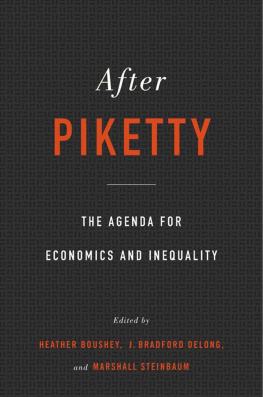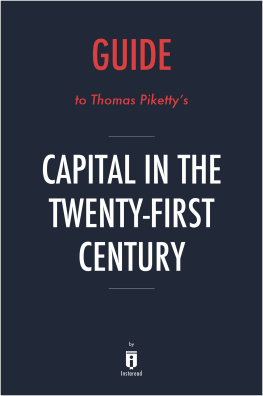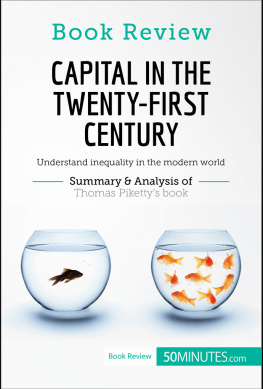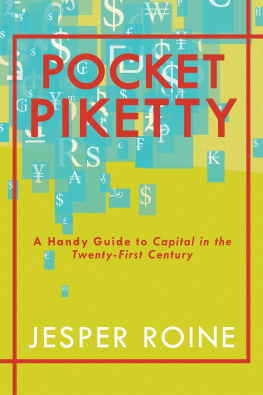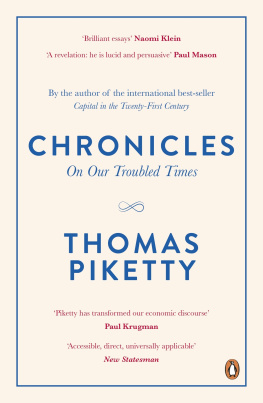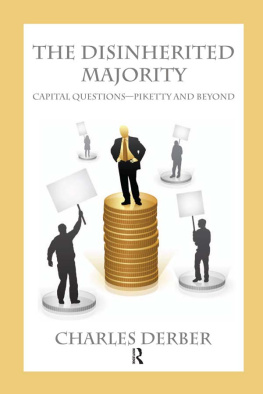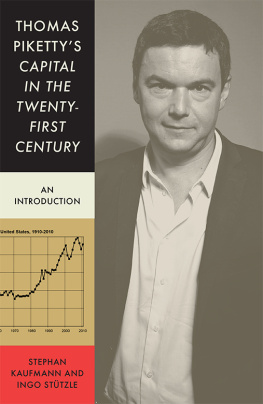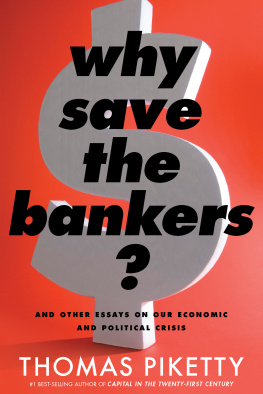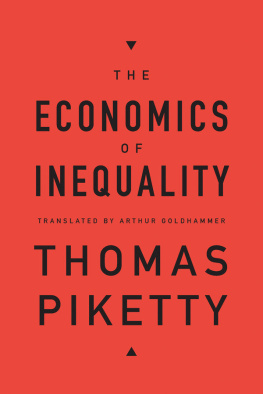AFTER PIKETTY
The Agenda for Economics and Inequality
Edited by
Heather Boushey
J. Bradford DeLong
Marshall Steinbaum


CAMBRIDGE, MASSACHUSETTS
LONDON, ENGLAND
2017
Copyright 2017 by the President and Fellows of Harvard College
All rights reserved
Design by Dean Bornstein
Cover design: Graciela Galup
978-0-674-50477-6 (alk. paper)
978-0-674-97817-1 (EPUB)
978-0-674-97818-8 (MOBI)
978-0-674-97819-5 (PDF)
The Library of Congress has cataloged the printed edition as follows:
Names: Boushey, Heather, 1970 editor. | DeLong, J. Bradford, editor. | Steinbaum, Marshall, editor.
Title: After Piketty : the agenda for economics and inequality / edited by Heather Boushey, J. Bradford DeLong, Marshall Steinbaum.
Description: Cambridge, Massachusetts : Harvard University Press, 2017. | Includes bibliographical references and index.
Identifiers: LCCN 2016048076
Subjects: LCSH: Piketty, Thomas, 1971 Capital au XXIe sicle. | CapitalSocial aspects. | EqualityEconomic aspects. | Wealth.
Classification: LCC HB501 .A457 2017 | DDC 332/.041dc23
LC record available at https://lccn.loc.gov/2016048076
As scholars, our work stands on the shoulders of those whove come before. It is in that spirit that we dedicate this volume to Anthony Atkinson (19442017), whose lifes work to document and understand economic inequality inspired usand we hope will continue to inspire generations of scholars to cometo ask fundamental questions about how the economy works and whom it works for.
Contents
- J. Bradford DeLong, Heather Boushey, and Marshall Steinbaum
- Arthur Goldhammer
- Robert M. Solow
- Paul Krugman
- Devesh Raval
- Suresh Naidu
- Daina Ramey Berry
- Eric R. Nielsen
- Laura Tyson and Michael Spence
- David Weil
- Branko Milanovic
- Christoph Lakner
- Gareth A. Jones
- Emmanuel Saez
- Mariacristina De Nardi, Giulio Fella, and Fang Yang
- Heather Boushey
- Mark Zandi
- Salvatore Morelli
- Marshall I. Steinbaum
- David Singh Grewal
- Ellora Derenoncourt
- Elisabeth Jacobs
- Thomas Piketty
J. BRADFORD DELONG, HEATHER BOUSHEY, AND MARSHALL STEINBAUM
Thomas Pikettys Capital in the Twenty-First Century, which we will abbreviate to C21, is a surprise best seller of astonishing dimensions.
Its enormous mass audience speaks to the urgency with which so many wish to hear about and participate in the political-economic conversation regarding this Second Gilded Age in which we in the Global North now find ourselves. that there are now 2.2 million copies of the book scattered around the globe in thirty different languages. Those 2.2 million copies will surely have an impact. They ought to shift the spirit of the age into another, different channel: post-Piketty, the public-intellectual debate over inequality, economic policy, and equitable growth ought to focus differently.
Yet there are counterbalancing sociopolitical forces at work. One way to look at Pikettys project is to note that, for him, the typical low-inequality industrialized economy looks, in many respects, like postWorld War II Gaullist France during its Thirty Glorious Years of economic growth, while the typical high-inequality industrialized economy looks, in many respects, like the 18701914 Belle poque version of Frances Third Republic. The dominant current in the Third Republic was radically egalitarian (among the male native born) in its politics, radically opposed to ascribed authorityespecially religious authorityin its ideology, and yet also radically tolerant of and extremely eager to protect and reinforce wealth. All those who had or who sought to acquire propertywhether a shop to own, a vineyard, rentes, a factory, or broad estateswere brothers whose wealth needed to be protected from the envious and the alien of the socialist-leaning laboring classes.
Underlying Pikettys book is a belief that this same cultural-ideological-economic-political complexthat all those with any property at all need to band together to protect any threats to the possession or the profitability of such propertywill come to dominate the twenty-first century political economy, in the North Atlantic at least. It will thus set in motion forces to keep the rate of profit high enough to drive the rise of the plutocracy Piketty sees in our future.
Two years ago we editors would have said, maybe, but also maybe not. In the wake of the 2016 presidential election in the United States, however, Pikettys underlying belief looks stronger. While we will not repeat the cultural dominance of property of the 18701914 Belle poque French Third Republic, we do look to be engaged in the process of echoing many of its main characteristics.
It is important to note that Donald Trump won the 2016 presidential election thanks to the electoral college and not because he got more votes. But he got a lot of votes, and he got them in some places that have historically voted Democratic but faced extreme economic dislocation in the recent past. Moreover, Hillary Clinton failed to achieve the margins among young voters and racial minorities that Barack Obama did, plagued as they are with historically low employment rates, despite the record-high student debt they were promised would lead to security in the labor market. And so Pikettys analytical political-economic case looks to us to have been greatly strengthened by Trumps presidential election victory.
Thus we believe our book is even more important now. And so we have assembled our authors and edited their papers to highlight what we, at least, believe economists should study After Piketty as they use the book to sharpen their focus on what is relevant and important.
Outside of Economics
In social science discussions outside of economics, we see Pikettys book making a definite splash. C21 has achieved a major intellectual victory. It is shaping sociological, political science, and political-economic debate. Other social sciences definitely feel the impact of Pikettys arguments about the likelihood and effects of rising inequality.
What is that impact on historians, sociologists, political scientists, and others? We believe that the best summary sketch of the impact of C21 on the social sciences outside of economics is, somewhat paradoxically, written by an economist: Paul Krugman. In of this volume, Krugman notes that the last historical period of great inequalitythe First Gilded Ageshowed that such great inequality was perfectly compatible with what was then seen as radical (white, male) democracy, for then as now great wealth purchased great influencenot just over policies, but over public discourse. As of this writing in December 2016, we see this in the prospective formation of an American cabinet richer than any before. It was not just that wealth provided a megaphone with which to amplify the voices of the wealthy both in the corridors of power and in the public sphere. In addition, wealth induced sociological patterns of emulation, including in what qualifies someone for high office and whose interest its acceptable for senior officials to serve.

